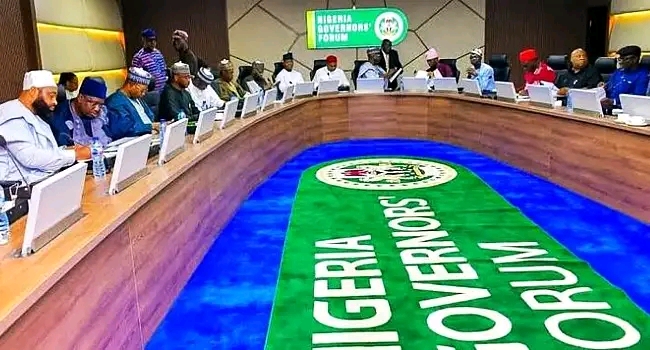The Federal Government has announced its willingness to engage in discussions with the leaders of the planned nationwide protests scheduled for August 1-10.
During an emergency meeting in Abuja on Wednesday, federal ministers were instructed to visit their respective states between July 24 and August 1, the start date of the protests.
Additionally, selected ministers will convene with state governors at the 143rd session of the National Economic Council at the Council Chamber of the Aso Rock Villa in Abuja on Thursday.
These measures were part of the action points from the emergency meeting between the Secretary to the Government of the Federation, George Akume, and all federal ministers held on Wednesday morning.
A circular sighted by newsmen on Tuesday evening showed that Special Advisers to the President on Policy and Coordination, Ms. Hadiza Bala-Usman; Information and Strategy, Bayo Onanuga and former Minister of Youth and Sports, Sunday Dare, were among those invited for the meeting convened to discuss the ‘Planned Nationwide Protest.’
The circular read, “I am directed to invite you to attend a meeting with the Secretary to the Government of the Federation on the above subject slated as follows:
“July 24, 2024, Time: 10 am Prompt, Venue: Office of the Secretary to the Government of the Federation Conference Room. Attendance is mandatory. Please accept the warm regards of the Secretary to The Government of the Federation.”
The meeting came amid calls for nationwide protests from August 1-10 against the rising cost of living and the harsh conditions as Africa’s most populous country faces what has been described as its worst economic headwinds in a generation.
The protest tagged ‘EndBadGovernance’ has gained traction on social media and has been scheduled to hold across all 36 states and the Federal Capital Territory. However, its organisers have remained largely anonymous as no group has come forward to take responsibility.
Upon assuming office 14 months ago, President Tinubu announced an end to petrol subsidies, which he said would save the government monies for infrastructural expansion. He also unified the foreign exchange rates to curb currency arbitrage.
However, these moves sparked collateral slump in the value of the Naira as food prices soared. More so, widespread insecurity in many farming communities has displaced farmers, contributing to higher food prices.
Although journalists were not granted access to the SGF Conference Room, the venue of Wednesday’s meeting, sources privy to the discussions told one of our correspondents that a planned nationwide broadcast by President Bola Tinubu was part of the issues discussed.
The source said, “All ministers were present. They suggested that there should be a national address. It was suggested that the President himself should do it. But the suggestion will have to reach the President first.”
“They also asked ministers to put together three key achievements they have made in the past year. They will compile these achievements and present them to Nigerians.”
“In fact, tomorrow (today), the Minister of Finance will be briefing the media on the state of the economy. But those achievements will be compiled for a separate presentation.”
Our source added, “The government stands for dialogue. They will get the leaders (of the protest) to meet with the government for discussions.”
“All the ministers will also go back to their states to engage their people so they won’t be misled into joining the protests. That is between now and the protest date.”
“Some have been engaging their people before. But this time, everyone has been asked to go back there.”
Another source privy to Wednesday’s meeting outcome, who also spoke on condition of anonymity, told The newsmen that some ministers—such as those of Finance and Budget and Economic Planning— who sit on the National Economic Council, will attend its 143rd meeting on Thursday to appeal to state governors to dialogue with their constituents.
NEC, a statutory body mandated to advise the President on the nation’s economic affairs, comprises the Vice President, Governors of the 36 states of the federation, Governor of the Central Bank of Nigeria, the Minister of Finance, and other stakeholders.
“There will be a NEC meeting tomorrow (today). So, they will be going there to get the buy-in of the governors. They will use NEC to get the governors’ support for the plan.”
“The government is extending the dialogue to NEC to allow governors to join what it is trying to do.”
“The way the government sees this protest is that it is not just a protest against hardship or Tinubu. Some people want to use it to undermine the Nigerian state and bring it down and target some class of people entirely,” said the source.
The August 1 protest comes on the heels of similar demonstrations in Kenya, from which experts say Nigerians may have drawn inspiration.
Kenyan youths staged massive protests for weeks, forcing President William Ruto’s government to backtrack on tax hikes. Organisers used social media platforms like X and Instagram to mobilise millions of young Kenyans for protests—a similar strategy deployed on Nigerian social media space.
In October 2020, Nigeria experienced massive protests nationwide when thousands of young people demonstrated against police brutality.
The protests, which were later hijacked, turned violent, with billions of naira worth of property destroyed amid bloodshed, which organisers blamed on security forces, who denied using live rounds.




